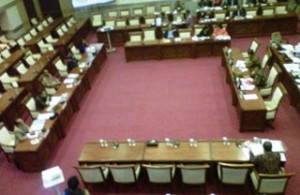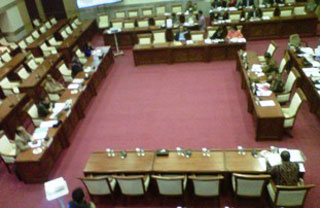 The low absorption of the budget by the government, both at the central and regional levels (pemda), has always been the theme of the news that surfaced in the media at the end of each year. Until early November 2013, the Ministry of Home Affairs (Kemendagri) noted that the average absorption of local government budgets throughout Indonesia was only 68%. Meanwhile in December 2013, the Ministry of Finance (Ministry of Finance) said that the realization of capital expenditures only reached 52.7% of the ceiling. Capital spending is government spending that has a major impact on development, because it includes infrastructure spending.
The low absorption of the budget by the government, both at the central and regional levels (pemda), has always been the theme of the news that surfaced in the media at the end of each year. Until early November 2013, the Ministry of Home Affairs (Kemendagri) noted that the average absorption of local government budgets throughout Indonesia was only 68%. Meanwhile in December 2013, the Ministry of Finance (Ministry of Finance) said that the realization of capital expenditures only reached 52.7% of the ceiling. Capital spending is government spending that has a major impact on development, because it includes infrastructure spending.
The low absorption of the budget, especially the capital expenditure budget at the end of the year, will certainly disrupt the performance and quality of public services that should be provided by the government to the public. Many infrastructure development projects have not been implemented, thereby hampering economic growth and harming the community. The low absorption of capital expenditure will also reduce the quality of public services in the health and education sectors that will be received by the public.
Seeing this phenomenon, the Center for Regional Information and Studies (PATTIRO) believes that society should function as a driver to accelerate budget absorption, especially the budget for capital expenditures. Law number 14 of 2008 concerning Public Information Disclosure (UU KIP) guarantees the public’s right to know public information. Based on Article 9 of UU KIP, information regarding the budget and its use is periodic public information which is the obligation of public agencies to provide it at least once every six months.
In addition, through the Minister of Home Affairs Instruction number 188.52/1797/SJ concerning Increasing Transparency in Regional Budget Management, Local Governments (pemda) are instructed to carry out transparency on budget plans and budget realization in all Regional Work Units (SKPD). On the basis of these two regulations, the Information Management and Documentation Officer (PPID) in the government should regularly inform the plans and realization of the budget made by the government, especially local governments.
In several government agencies, at the central and regional levels, which have formed PPIDs, information regarding plans and realization of the expenditure budget is regularly available. For example, PPID for the province of West Nusa Tenggara (NTB) provides regular information on the budget and can be accessed by anyone via the website www.ppidntb.net. Through this site, PPID NTB does not only provide information about the budget. Other public information which is the obligation of a Public Agency, which is periodic information, at any time, and immediately in accordance with the provisions of the KIP Law, is also available and neatly arranged. Even when the information sought is not found, the public can request it through the site according to the procedure.
If information about the budget has been provided by the government, then the community can be empowered to carry out monitoring and evaluation (monev) of the use of the budget, especially the budget for capital expenditures. So, when there is a capital expenditure budget that has not been absorbed, the public can ask what the cause is and how and when it will be implemented.
But unfortunately the task of conducting monitoring and evaluation of the budget is not an easy job. Communities need to be strengthened through an advocacy process (educated, trained, guided, assisted, assisted and facilitated) so they can carry out this task. The first step that must be taken is to inform and build awareness in the community that they actually have the right to public information provided by public bodies (government).
The main task of the government as a public service provider, should be followed by conveying the results of the work of the public services they provide to the people (society). The government should have the courage to ask the public to conduct monitoring and evaluation of the public services that have been produced. This will be useful to improve the performance of public services that have been provided. Therefore, building public awareness of the right to information should be part of the government’s work.
Then what about the task of providing community strengthening through an advocacy process so that they are able to monitor and evaluate, not only the budget, but also all the public services they receive? Whose task is it? In article 5 (five) of the Minister of Home Affairs Regulation (Permendagri) number 19 of 2007 concerning Community and Village/Kelurahan Empowerment Training it is stated that the implementers of community empowerment training are the Ministry of Home Affairs, Provincial Governments, District/City Governments, and non-government training institutions accredited. With reference to the Permendagri, it means that the task of providing reinforcement is the duty of the government.
However, in reality, the process of community strengthening by the government is not running well. In many areas, the task of strengthening the community is mostly carried out first by Non-Governmental Organizations (NGOs) as PATTIRO has done in many areas in Indonesia. Pattiro develops models and approaches to community strengthening that can be adopted or developed by the government, so that they become more massive and have a wider impact.
PATTIRO’s work in advocating for the community to become a force that is aware of their right to information and conducting monitoring and evaluation of the performance of the budget and public services has yielded many results. Examples of this success include the awakening of public awareness in Manokwari, Papua, to request information so as to obtain certainty about the schedule of the Puskesmas, or community groups in East Flores who question the increase in transportation fares, and so on. (For complete results of PATTIRO’s work in strengthening community capacity, see http://pattirocati.wordpress.com/)
Strengthening the community’s capacity, if it is carried out continuously with continuously improved quality, the community will gradually realize their right to information that they should receive and be able to conduct monitoring and evaluation of the budget and performance of public services. Communities know and are aware of their rights to public services that they should receive in the form of infrastructure development, education and health. If there is a capital expenditure budget for infrastructure development, or public services in the health and education sectors that have not been implemented, the public can ask the relevant agencies and push for them to be implemented immediately. This will encourage absorption of the capital expenditure budget.
So that the public is aware of their right to information and is able to carry out monev on the performance of the budget and public services so as to be able to encourage an increase in budget absorption, especially capital expenditure. PATTIRO recommends to the Government, especially the Ministry of Home Affairs to:
- Encouraging Regional Governments, provincial, district/city levels, which have not yet formed a PPID to immediately form a PPID.
- Encouraging Regional Governments that have formed PPIDs to organize public information properly, as was done by the NTB Province PPID, so that public information such as information about the budget or other public information, which is issued periodically, at any time and immediately is in accordance with the provisions of UU KIP , can be implemented quickly, on time, low cost and in a simple way.
- Conduct training activities to strengthen the capacity of the community to be aware of their rights to information and public services that they should receive, as well as being able to conduct monitoring and evaluation of budget performance, especially for public services.
Jakarta Desember 10, 2013
Sad Dian Utomo | Direktur Eksekutif PATTIRO
saddian@pattiro.org | 0812 800 3045
Contact Person:
Agus Wibowo| Penguatan CSO Specialist
guswibowo@pattiro.org
The Regional Research and Information Center (PATTIRO) is a non-profit organization that encourages the realization of good, transparent and fair local governance for the social welfare of the community. PATTIRO, which was established on April 17, 1999 in Jakarta, is engaged in research and advocacy with a focus on local governance issues, especially decentralization. PATTIRO’s focus areas consist of public service delivery improvement; public policy reform; and public budget management reform.
(for details please see www.pattiro.org)





